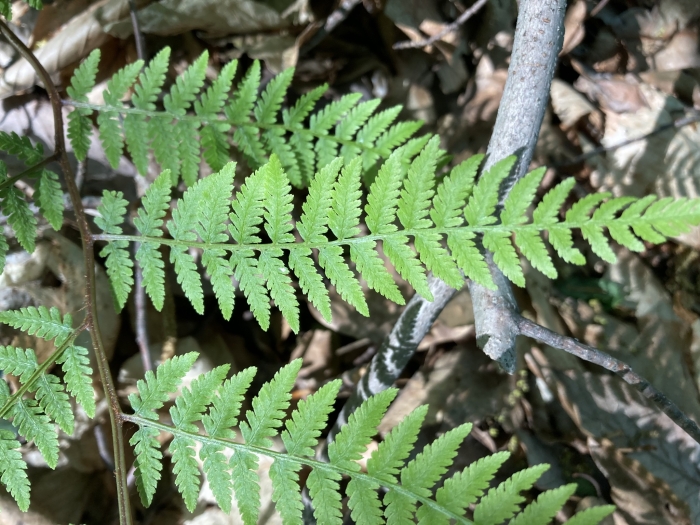Southern Lady Fern
(Athyrium asplenioides)
Southern Lady Fern (Athyrium asplenioides)
/
/

tkr421
CC BY 4.0
Image By:
tkr421
Recorded By:
Copyright:
CC BY 4.0
Copyright Notice:
Photo by: tkr421 | License Type: CC BY 4.0 | License URL: http://creativecommons.org/licenses/by/4.0/ | Rights Holder: tkr421 | Publisher: iNaturalist | Date Created: 2021-05-01T18:27:13-07:00 |


















































Estimated Native Range
Summary
Athyrium asplenioides, commonly known as Southern Lady Fern, is a deciduous perennial herb native to the moist, shaded forest floors and swampy woodlands of the Eastern United States and Canada. It typically grows to a height and width of 2-3 feet (0.6-0.9 meters). The fern is characterized by its delicate, lace-like fronds that are pale green in color and can add a soft texture to garden compositions. While it does not produce flowers, its fronds are highly ornamental and provide visual interest from spring until frost.
Southern Lady Fern is valued for its ease of maintenance and its ability to thrive in shady conditions, making it an excellent choice for woodland gardens, shaded borders, and as a ground cover under larger trees. It prefers consistently moist, well-drained soil rich in organic matter and can tolerate a range of pH levels. It is relatively pest-free but can be susceptible to fungal diseases in overly wet conditions. This fern is also appreciated for its resistance to deer browsing. In terms of light requirements, it performs best in full to part shade. There are no significant cultivars of this species, but its natural form is widely appreciated in cultivation.CC BY-SA 4.0
Southern Lady Fern is valued for its ease of maintenance and its ability to thrive in shady conditions, making it an excellent choice for woodland gardens, shaded borders, and as a ground cover under larger trees. It prefers consistently moist, well-drained soil rich in organic matter and can tolerate a range of pH levels. It is relatively pest-free but can be susceptible to fungal diseases in overly wet conditions. This fern is also appreciated for its resistance to deer browsing. In terms of light requirements, it performs best in full to part shade. There are no significant cultivars of this species, but its natural form is widely appreciated in cultivation.CC BY-SA 4.0
Plant Description
- Plant Type: Fern
- Height: 2-3 feet
- Width: 2-3 feet
- Growth Rate: Moderate
- Flower Color: N/A
- Flowering Season: Non-Flowering
- Leaf Retention: Deciduous
Growth Requirements
- Sun: Full Shade, Part Shade
- Water: Medium
- Drainage: Medium
Common Uses
Border Plant, Deer Resistant, Low Maintenance, Rabbit Resistant, Water Garden
Natural Habitat
native to the moist, shaded forest floors and swampy woodlands of the Eastern United States and Canada
Other Names
Common Names: Asplenium Ladyfern
Scientific Names: , Athyrium filix-femina var. asplenioides, Athyrium filix-femina subsp. asplenioides, Athyrium asplenioides, Athyrium filix-femina f. rectangulare, Nephrodium asplenioides, Athyrium asplenioides f. subtripinnatum, Athyrium filix-femina f. plano-rhoeticum, Athyrium filix-femina var. commune, Allantodia asplenioides
GBIF Accepted Name: Athyrium asplenioides (Michx.) Desv.